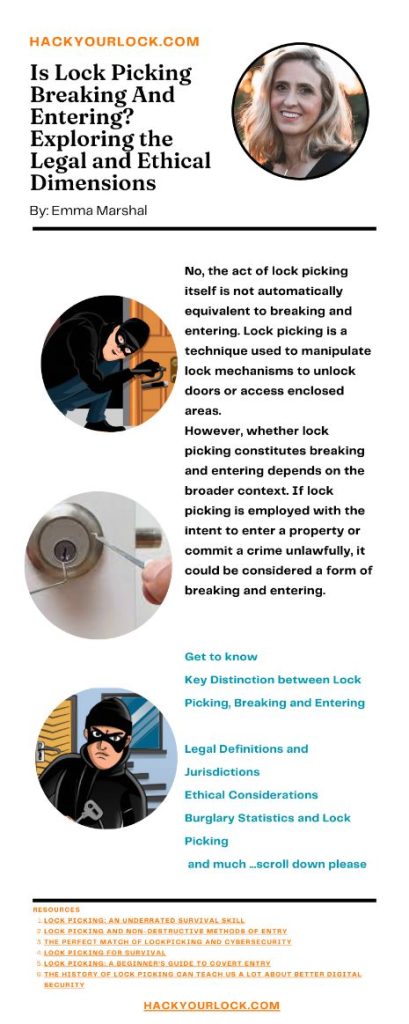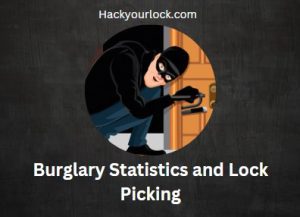Have you ever seen a movie where someone magically unlocks a door? But here’s the question: is this “unlocking magic” actually a bad thing? Welcome to the world of lock picking and its connection to breaking and entering.
This article dives into this puzzle, asking whether picking locks is right or wrong. We’ll sort out this puzzle about “Is Lock Picking Breaking and Entering?” and determine if this skill can be used for bad stuff. We’ll explore the rules and what’s right and see how picking locks might lead to sneaky behavior. Ready for this adventure? Let’s go and figure out whether lock picking is connected to breaking and entering.

Contents
Is Lock Picking Breaking And Entering?
No, the act of lock picking itself is not automatically equivalent to breaking and entering. Lock picking is a technique used to manipulate lock mechanisms to unlock doors or access enclosed areas.
However, whether lock picking constitutes breaking and entering depends on the broader context. If lock picking is employed with the intent to enter a property or commit a crime unlawfully, it could be considered a form of breaking and entering.
On the other hand, if lock picking is done legally and ethically, such as by locksmiths or for educational purposes, it may not be classified as breaking and entering. The determination revolves around the intention behind the lock picking and whether it leads to unauthorized and unlawful access.
Key Distinction between Lock Picking, Breaking and Entering
Lock Picking
Lock picking is the skillful technique of manipulating the components of a lock to gain entry without using the intended key. This method involves a deep understanding of lock mechanisms and the use of specialized tools to manipulate pins, levers, or tumblers and thereby unlock the mechanism. Lock Picking: A Beginner’s Guide To Covert Entry lets you know about what lock picking is all about and how you can pick locks at a beginners level.
Lock picking is not breaking and entering but a survival skill as revealed in Lock Picking: An Underrated Survival Skill.
Breaking and Entering:
Breaking and entering refers to the illegal act of unlawfully entering a property, building, or dwelling without permission or authorization. This can involve forceful actions such as breaking windows, forcing doors, or using tools to gain entry.
Key Distinction
The crucial difference between lock picking and breaking and entering lies in the approach. The critical distinction between both answers the query, “Is lock picking breaking and entering?” Lock picking is a non-destructive methodthat doesn’t involve forceful entry while breaking and entering often involves causing damage or using force to gain access unlawfully.
Lock Picking And Non-Destructive Methods Of Entry also reveal that lock picking and breaking are two different phenomenons.
Legal Definitions and Jurisdictions
Legal definitions of lock picking and its relation to breaking and entering can differ across jurisdictions. In some regions, lock picking might be explicitly connected to breaking and entering laws, while the distinction is clearer in others.
For instance, certain legal systems consider lock picking as a component of breaking and entering due to its nature of unauthorized access.
Notable legal cases have shaped how lock picking is interpreted within the context of breaking and entering. Cases like State v. Roberts and People v. Sullivan have set precedents in establishing whether lock picking inherently constitutes breaking and entering or whether additional criminal intent must be proven.
In essence, the legal landscape surrounding lock picking and breaking and entering is nuanced, influenced by regional legislation and key legal cases that provide clarity to this intricate matter.
Ethical Considerations
Ethical considerations encompass the practice of lock picking, questioning whether it inherently signifies criminal motives. Beyond the shadow of a doubt, locksmiths and security experts employ lock picking as a vital tool for legitimate purposes, like aiding people locked out of their own property or enhancing security systems. This highlights the duality of lock picking’s intent and application.
If you dig a little deeper, you’ll discover that lock picking has a wide range of purposes. As a hobby, enthusiasts frequently investigate it because they are curious and want to comprehend complex mechanics.
Similarly, security companies and educational institutions use lock picking as a teaching technique to highlight flaws and provide defenses.
However, the ethical gray area emerges when lock picking is misused for criminal activities. This complexity challenges the perception of lock picking as a purely benign skill.
Striking a balance between honing expertise and responsible conduct is essential. Ultimately, ethical considerations underscore the importance of distinguishing between lawful and unlawful applications of lock picking.
Burglary Statistics and Lock Picking

Recent burglary statistics reveal a detailed picture of entry methods. Lock picking is a minor factor, accounting for just 4.1% of unlawful entries.
Meanwhile, forcible methods, like breaking doors or windows, constitute 60.5%, while unauthorized entries (non-forced) represent 33.2%.
This data illustrates that lock picking is not a prevalent choice among burglars, with most opting for more forceful means of entry.
Lock picking’s prevalence in burglaries remains notably low, constituting a mere 4.1% of unlawful entries.
This statistic underscores that burglars predominantly opt for other methods. Common tools like screwdrivers, crowbars, and hammers constitute 66.8% of forcible entries.
Burglars often favor quicker, less complex approaches, indicating that lock picking is not their primary choice when seeking unauthorized access.
Case Studies
Case A
In Case A, a residential break-in involved a combination of methods. Lock picking was employed alongside forced entry, demonstrating its supplementary role.
The burglars attempted to exploit the element of surprise by picking locks to gain silent access while simultaneously using force to ensure swift entry.
This case underscores that lock picking can serve as a tactical tool for burglars seeking alternative means of access, enhancing their chances of avoiding immediate detection.
Case B
Conversely, Case B shed light on lock picking as the sole method for unauthorized entry. The perpetrators skillfully picked the locks of a commercial establishment, avoiding any blatant signs of intrusion.
This instance highlights that for certain burglars, lock picking alone can effectively achieve their goals, especially in cases where speed, subtlety, and evading security measures are paramount.
Analysis
Examining these situations in a larger context highlights the importance of considering unique circumstances. The importance of lock picking varies based on the setting, target, level of expertise, and goals of the thief.
Due to this intricacy, evaluating the importance of lock picking in burglaries requires a sophisticated approach, considering that it may either be a primary tool or a subsidiary component of the overall strategy.
Legal Consequences of Lock Picking
Legal consequences loom over lock pickers involved in criminal acts. Utilizing lock picking to facilitate unauthorized entry can result in charges of breaking and entering, trespassing, or theft, escalating penalties based on the severity of the crime.
Navigating legal distinctions becomes intricate due to the blurred lines between different lock picking practitioners. While some are hobbyists or security researchers exploring vulnerabilities, others might have malicious intent.
Law enforcement must discern between lawful and unlawful use, underscoring the need for clear differentiation. Moreover, laws concerning the possession of lock picking tools differ across jurisdictions.
Some countries restrict possession of such tools without a valid reason, while others regulate them through licensing. These regulations intend to balance legitimate applications with the prevention of criminal misuse, safeguarding public security while permitting responsible lock picking activities.
Importance of Security Measures
Enhancing security is crucial to deter burglars, regardless of their method. Install top-notch locks, consider security systems, and ensure well-lit surroundings. These measures discourage unauthorized access.
Furthermore, fostering responsible lock picking practices is essential. For educational and legitimate purposes, lock picking can offer insights into vulnerabilities. Promoting ethical usage aligns with maintaining security while appreciating the craft’s educational value.
For those who are interested, The Perfect Match Of Lockpicking And Cybersecurity is a good reading resource to go through.
Conclusion
In conclusion, “Is Lock Picking Breaking and Entering?” delves into a complex topic. Summarizing the journey, we’ve uncovered crucial insights. Lock picking is a skill, not intrinsically breaking and entering, but its ethical and legal context matters significantly.
It’s evident that lock picking’s intent shapes its ethical standing. Balancing the curiosity-driven learning and legitimate applications with potential misuse is key. Ongoing dialogues about lock picking’s legal and ethical dimensions are essential.
This discourse ensures a nuanced understanding of its implications for security and privacy. Ultimately, it’s not just the picking of locks that defines breaking and entering; it’s the intent, the situation, and the larger ethical and legal framework that determine the boundary between legality and transgression.
FAQ’s
Is lock picking forced entry?
Picking locks is not seen as a forcible entrance. To gain access, forced entry usually entails physically breaking or harming a lock, door, window, or other obstacle. Lock picking, in comparison, is a non-destructive method of access since it involves adjusting the lock mechanism without leaving any physical signs of damage.
Are there legal consequences for lock picking, even if it’s not breaking and entering?
Yes, there can be. While lock picking itself might not always equate to breaking and entering, it can lead to legal issues if used for unlawful activities. Possession of lock picking tools and their intent can influence legal judgments, highlighting the importance of responsible and ethical use to avoid potential legal repercussions.
Do Burglars Pick Locks?
Yes, burglars do sometimes pick locks as a method of gaining unauthorized access to properties. However, it’s important to note that lock picking is just one of several approaches, and not all burglars rely on this method.
